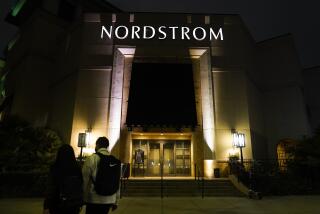Nordstrom reports 68% drop in profit
Shares of Nordstrom Inc. jumped in late trading after the upscale department store chain reported quarterly net income that beat analysts’ estimates and forecast a profit for the current year.
Nordstrom rose $1.37, or 12%, to $12.70 after U.S. markets closed. Before earnings were announced, the shares fell 56 cents, or 4.7%, to $11.33. They have dropped 15% this year.
“It was strong management through a difficult environment,” analyst Patricia Edwards said. The forecast means “they will be able to hold down the fort as the luxury consumer continues retrenching.”
Net income sank 68% to $68 million, or 31 cents a share, in the quarter that ended Jan. 31, the Seattle company said. Profit beat analysts’ estimates by a penny.
Nordstrom was able to limit markdowns during the worst holiday selling season in four decades, said Liz Dunn, an analyst with Thomas Weisel Partners. Consumers held back on discretionary purchases including apparel and accessories as job losses mounted amid the U.S. recession.
“They didn’t have to discount as much as I thought,” Dunn said. “The company’s strategies of offering lower price points and focusing on value seem to be panning out.”
For the year ending Jan. 30, 2010, Nordstrom forecast per-share profit of $1.10 to $1.40. Analysts projected $1.24, according to the average estimates compiled by Bloomberg.
Nordstrom reported Feb. 5 that total revenue declined 8.5% to $2.3 billion. A year earlier, it dropped 4.4%. In the year-earlier quarter, the chain posted profit of $212 million, or 92 cents a share.
Fourth-quarter same-store sales, including Internet and catalog shopping, fell 12.5%.
“Nordstrom knows what is selling well and can make decisions fairly quickly,” Edwards said. “They are not afraid to offer lower price points. They have certainly changed how they are attacking this, which is good because discounting is not enough.”
More to Read
Inside the business of entertainment
The Wide Shot brings you news, analysis and insights on everything from streaming wars to production — and what it all means for the future.
You may occasionally receive promotional content from the Los Angeles Times.










